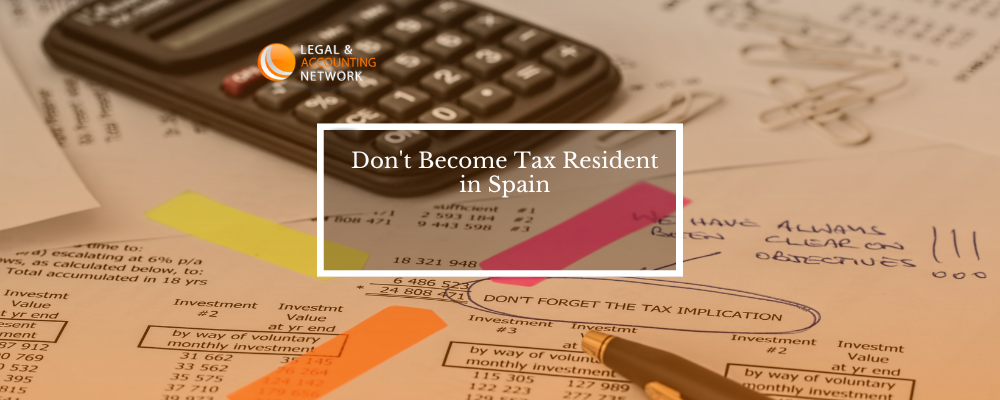Determining tax residency in Spain involves understanding the criteria and factors that determine one’s tax status. Residents and non-residents have different tax obligations, including taxes on income, capital gains, property, and inheritance. Expats moving to Spain should be aware of the implications on their worldwide income and possible exemptions. Property ownership in Spain may subject individuals to taxes on property gains and other related taxes. Pensioners should also consider specific tax considerations related to pensions and pension funds. It is advisable to seek professional advice from tax lawyers or advisors to optimize tax planning in Spain.
Determining Tax Residency in Spain
When it comes to taxation in Spain, it is crucial to understand the criteria and factors that determine tax residency. Becoming a tax resident in Spain entails certain obligations and implications, and it is important to navigate these waters carefully.
Criteria for Tax Residency in Spain
In Spain, the criteria for determining tax residency are based on guidelines provided by the OECD and the Spanish Tax Agency. One of the primary criteria is spending more than 183 days in Spain during a calendar year. Additionally, having a spouse or children residing in Spain or having economic interests in the country can also be taken into consideration.
Factors Affecting Tax Residency
Besides meeting the criteria mentioned earlier, other factors can influence tax residency status in Spain. These factors include personal and economic relationships within the country, such as owning property, carrying out business activities, or having substantial investments.
It is important to note that being a residence permit holder does not automatically make someone a tax resident in Spain. It is essential to evaluate all the relevant factors to determine one’s tax residency status accurately.
Differences Between Resident and Non-Resident Taxation
When it comes to taxation in Spain, there are significant differences between residents and non-residents. Understanding these distinctions is crucial for individuals navigating the Spanish tax system.
Tax Obligations for Residents in Spain
Residents in Spain are subject to a range of tax obligations. This includes the payment of income tax, capital gains tax, wealth tax, inheritance and gift tax, value-added tax (VAT), and contributions to social security.
Income tax is one of the primary taxes residents must pay on their worldwide income. The Spanish tax authorities use various criteria to determine tax residency, such as spending more than 183 days in Spain in a calendar year, having a spouse or children residing in Spain, or having economic interests in the country.
Residents may also be eligible for deductions and exemptions, which can help reduce their overall tax burden. It is important for residents to understand the different tax rates that apply to each type of tax and consult with professionals to optimize their tax situation.
Tax Obligations for Non-Residents in Spain
Non-residents in Spain have a different set of tax obligations compared to residents. Non-residents are only required to pay taxes on income generated within Spain, rather than on their worldwide income.
Non-residents must also fulfill their tax obligations regarding property ownership in Spain. They may be subject to taxes on property gains and other related taxes or fees based on their property or investments in Spain.
It is important for non-residents to understand their tax obligations and seek professional advice to ensure compliance with Spanish tax laws while optimizing their tax situation.
- Residents in Spain are subject to income tax, capital gains tax, wealth tax, inheritance and gift tax, VAT, and social security contributions.
- Non-residents only pay taxes on income generated within Spain.
- Non-residents with property ownership in Spain may face taxes on property gains and other related taxes.
- Residents and non-residents have different criteria for determining tax residency.
- Residents may be eligible for deductions and exemptions.
- Consulting with tax professionals is essential for optimizing tax planning in Spain.
Understanding the differences between resident and non-resident taxation is crucial for individuals planning to live or invest in Spain. By ensuring compliance with relevant tax obligations and seeking expert advice, individuals can navigate the Spanish tax system while maximizing tax efficiency.
Tax Implications for Expats Moving to Spain
Moving to Spain as an expat comes with important tax considerations. Understanding the implications of worldwide income and Spanish taxes is crucial to ensure compliance and make informed financial decisions. Additionally, expats may be eligible for exemptions and deductions that can help optimize their tax situation.
Understanding Worldwide Income and Spanish Taxes
Expats moving to Spain should be aware that they may be subject to taxes on their worldwide income. This means that income earned both within Spain and abroad must be reported and may be taxed accordingly. It is important to carefully track and declare all sources of income to avoid any potential issues with Spanish tax authorities.
Spanish taxes are calculated based on progressive tax rates, meaning that higher income levels are subject to higher tax rates. It is advisable to understand the tax brackets and rates applicable in Spain to anticipate and plan for potential tax liabilities.
Exemptions and Deductions for Expats
Expats in Spain may be eligible for certain exemptions and deductions that can reduce their tax burden. These exemptions and deductions can vary depending on individual circumstances, such as the type of income, residency status, and specific tax treaties between Spain and other countries.
- Double Taxation Treaties: Spain has signed double taxation treaties with many countries to avoid the double taxation of income. Expats should explore these treaties to take advantage of any applicable provisions.
- Foreign Tax Credits: In some cases, expats may be able to claim foreign tax credits for taxes paid on income earned outside of Spain. This can help offset the tax liability in Spain.
- Special Deductions: Certain deductible expenses, such as mortgage interest, tuition fees, or healthcare costs, may be available to expats. It is important to review the specific deductions allowed under Spanish tax laws.
Expats should consult with tax lawyers or advisors who specialize in international taxation to navigate the complex landscape of exemptions and deductions. These professionals can provide personalized guidance based on individual circumstances and ensure compliance with Spanish tax regulations.
Implications of Property Ownership in Spain
Property ownership in Spain carries various tax implications that individuals should be aware of. This section explores the taxes related to property ownership, including taxes on property gains and other considerations for property owners.
Taxes on Property Gains
When selling a property in Spain, individuals may be subject to taxes on property gains. The tax rate can vary depending on factors such as the length of ownership and the value of the property. It’s important to understand the potential tax liability and plan accordingly when considering the sale of a property.
Other Tax Considerations for Property Owners
In addition to taxes on property gains, property owners in Spain should consider other tax obligations. These may include property taxes (known as “Impuesto sobre Bienes Inmuebles” or IBI), wealth taxes (known as “Impuesto sobre el Patrimonio”), and potential inheritance and gift taxes. It’s crucial to evaluate these obligations and seek professional advice for proper tax planning.
Property owners should also be aware of any rental income tax obligations if they choose to rent their property. Rental income is generally subject to taxation, and it’s necessary to declare it appropriately to the tax authorities.
Furthermore, individuals with multiple properties in Spain should consider the aggregation rules for calculating their tax liabilities accurately. These rules aim to prevent individuals from benefiting from tax exemptions by spreading their properties across entities or individuals.
Specific Tax Considerations for Pensioners in Spain
When it comes to tax considerations for pensioners in Spain, there are specific factors to keep in mind. Pensioners residing in Spain may be subject to taxation on their pension income, as well as any additional income sources. Let’s explore the key aspects:
Taxation of Pensions and Pension Funds
Pension income received by individuals living in Spain is generally taxable. Both state and private pensions are included in this taxation. The amount of taxable pension income depends on various factors, including the type of pension and the recipient’s overall income.
- The Spanish tax authorities consider the “personal income tax” (impuesto sobre la renta de las personas físicas or IRPF) for the taxation of pension income.
- Expats residing in Spain are required to declare their pension income in their annual tax return.
- The tax rate applied to pension income depends on the total income received and is progressive, meaning that higher income levels are subject to higher tax rates.
Benefits and Exemptions for Pensioners
Pensioners in Spain may also avail themselves of certain benefits and exemptions to optimize their tax situation. These provisions can help reduce the overall tax liability on pension income and provide financial relief. Below are some noteworthy considerations:
- Pensioners’ Allowance: Spain offers a specific allowance for pensioners, intended to ease the burden of taxation. This allowance reduces the taxable portion of the pension income, resulting in lower overall tax liability.
- Double Taxation Treaties: Spain has signed double taxation treaties with several countries, allowing pensioners to avoid or minimize paying taxes on their pension income in both their home country and Spain. These treaties prevent income from being taxed twice.
- Additional Deductions: Pensioners may also be eligible for additional deductions related to healthcare costs, disability, or specific circumstances. These deductions can further reduce the taxable amount and potentially mitigate tax obligations.
It’s essential for pensioners in Spain to consult with tax advisors or experts who can provide personalized guidance tailored to their specific situation. With careful planning and knowledge of the tax laws and benefits available, pensioners can navigate the taxation system to potentially optimize their financial resources in Spain.
Seeking Professional Advice for Optimal Tax Planning
When it comes to navigating the complex world of taxes in Spain, seeking professional advice from experienced tax lawyers and advisors is crucial for ensuring optimal tax planning. Our experts possess in-depth knowledge of the Spanish tax system and can provide valuable guidance tailored to your specific situation.
Consulting with Tax Lawyers and Advisors
Consulting with tax lawyers and advisors can help you understand the intricacies of the Spanish tax regulations and assist you in making informed decisions. These professionals can assess your tax residency status, analyze your income sources, and provide guidance on how to minimize your tax liability.
They will work closely with you to determine the most beneficial tax strategies, taking into account any international tax treaties that may apply to your situation. Their expertise is particularly important if you have complex financial arrangements or investments across multiple jurisdictions.
Maximizing Tax Efficiency in Spain
Maximizing tax efficiency in Spain involves taking advantage of the available deductions, exemptions, and incentives offered by the Spanish tax system. Tax lawyers and advisors can identify opportunities to optimize your tax planning and ensure compliance with Spanish tax laws.
- They can help you navigate the various tax benefits available for specific activities, such as research and development or investments in certain industries.
- They can guide you on potential tax deductions related to business expenses, education, or healthcare costs, ensuring you make the most of your eligible deductions.
- They can advise on the optimal structure for your assets and investments to minimize tax liabilities and maximize returns.
By working with tax professionals, you can stay updated on any changes in tax regulations, benefit from their extensive knowledge, and ensure that you are meeting all your tax obligations in Spain while making the most of available tax planning opportunities.







